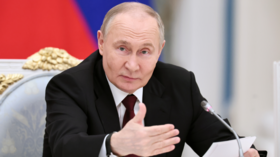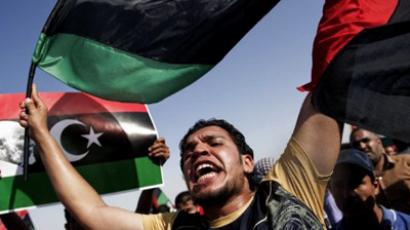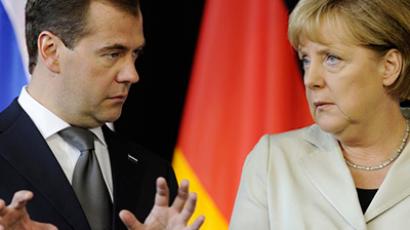UK kicks out remaining Libyan diplomats
Britain has expelled all staff of the Libyan embassy in London. The eight people will be given three days to leave the country. Envoys from the rebel government in Benghazi are expected to take over the building.
Acting Charge d’Affairs Khaled Benshaban was informed about the expulsion on Wednesday, the Foreign Office said.The emptied building will be reportedly handed over the envoys of the rebel National Transitional Council (NTC), which the UK regards as legal representatives of the Libyan people.Nations regarding the NTC as Libya’s legal government include the US, France, Italy, Germany and Spain among others.On Wednesday, British Foreign Secretary William Hague said the National Transitional Council had been invited to send an ambassador to London. “We will deal with the National Transitional Council on the same basis as other governments around the world," he added. He also stated that Britain will unfreeze Libyan oil assets (around $150 million) to help transitional government.Former UK ambassador to Libya Oliver Miles has explained what the sum will be spent on.“The money has been released because it’s needed for all sorts of purposes. Most particularly, don’t forget Libya is a country which is almost totally dependent on oil revenue. The oil revenue has been cut off now for six months or something like that. Most of the people employed in Libya are employed in the public sector, and they’ve not been given any salaries. So the money is desperately needed,” he said, adding though that sum is “not very large compared to the needs of people.”
Meanwhile, Jeremy Corbyn, British opposition Labour Party MP and a peace campaigner, says that support for the opposition group is now a great concern, because it is really unclear where it comes from. “It is known they have had political support from a number of Gulf-Cooperation Council countries and Saudi Arabia. But it is known Qatar has been handling oil sales on their behalf. It is known that France has been giving them as much aid as it possibly can. And also, apparently, there are special forces from a number of countries operating on their behalf in Libya.”
Earlier this year, Libyan Ambassador Omar Jelban had been expelled from Britain in response to the attack on the British embassy in Tripoli.The move to expel the pro-Gaddafi diplomats from London is rather more symbolic than practical, says Mark Almond, a professor of modern history at Oxford University.“Traditionally Britain has recognized government not on the basis of whether we liked them or not, but on whether they controlled the territory of the state. Colonel Gaddafi may have lost control of part of Libya, but clearly the rebels don’t control it yet. So this sets a new precedent, and a dangerous one,” he told RT.He added that the campaign, which was promised to end in a matter of weeks, but has lasted for months with little success for the rebels and their NATO supporters, showed how weak the European military may turn out to be when facing a resilient enemy.“In practice this symbolic decision to recognize the rebels and kick out Gaddafi’s diplomats from London masks a deep embarrassment and a strategic crisis for the NATO countries, led by Britain and France,” he said.The expulsion comes after Lockerbie bomber Abdelbaset Al Megrahi was reported on Wednesday as appearing at a pro-government rally. Al Megrahi was given a life sentence in the UK for organizing the bombing of a Pan Am passenger plane in 1988, which killed 270 people.He was later diagnosed with prostate cancer and handed over back to Libya to die. In 2009, when this happened, Al Megrahi was believed to have only three months to live.William Hague says the footage shows that the medical advice on the convicted terrorist’s condition was “pretty worthless”.
Tripoli has condemned the UK for recognising the rebels as Libya's government authority. The Libyan deputy foreign minister, Khaled Kaim, called the decision “unprecedented in diplomatic history.”He considered it "a stain on the forehead of Britain.”“It's illegal, it's irresponsible and for us it was a surprise to happen from the British government because, I mean, if other countries follow Britain, then international diplomacy will be in chaos,” he told reporters.He added that Libya would seek to reverse the decision both through British courts and the International Court of Justice.













